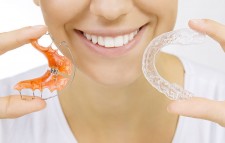
After receiving orthodontic treatment, patients are assigned a retainer. Removable retainers may be worn only at night or throughout the day. Can these retainers harbor bacteria and lead to cavities?
SACRAMENTO, Calif., May 13, 2019 (Newswire.com) - A patient recently asked via the Sacramento Dentistry Group website whether an overnight retainer could cause cavities or tooth decay. The correct answer to this question should be: “It depends.” Removable retainers certainly provide more surface area for oral bacteria to live and thrive, but hygiene habits determine whether a retainer contributes to oral caries.
Retainers are worn after completing an orthodontic treatment. The length of time they are worn depends on the specific procedure and the nature of the malocclusion. Some patients only wear a removable retainer at night, others for longer periods. Permanent retainers are also used. These are bonded to the teeth for an extended period, if not indefinitely. Length of retainer use and the type to be used are discussed with the dentist or orthodontist before treatment is complete.
Types of Removable Retainers
If a removable retainer is selected, there are two main types. The well-known Hawley retainer features a plastic base that fits up against the roof of the mouth. Wires run from the base and wrap around the teeth, preventing relapse so the teeth stay straight. An Essix retainer looks very much like a night guard, mouthguard or plastic aligner (like those made by Invisalign).
Either type of removable retainer requires regular cleaning, just like the teeth. The retainers are in the same environment as the teeth and soon are covered with the same bacteria. Of the two, the Essix retainer is more likely to bring oral bacteria in direct contact with the teeth, since it covers the teeth nearly completely. With the Hawley retainer, outside of the thin wires featured in its construction, the only part of the mouth that is covered is the roof, but that certainly does not stop the bacteria on the retainer from migrating to the teeth.
Cleaning Retainers
Therefore, a daily retainer cleaning regimen is recommended. This is simply the same treatment given to the teeth but without the toothpaste. Patients should be cautious of using toothpaste on retainers, as they are slightly abrasive and can wear out acrylic or plastic parts. Dish soap may be used as a toothpaste substitute, with a thorough rinse afterward. Occasionally, denture cleansing tablets are also a good choice for retainer cleansing, when used according to directions. Always bring a retainer to any dental appointments, where it can be thoroughly cleaned ultrasonically, much like dental instruments.
For more information on orthodontics, retainers and how to straighten teeth and keep them that way, dental patients may visit the website of the Sacramento Dentistry Group. Consultations are available by making an appointment online or by calling 916-538-6900.
Source: Sacramento Dentistry Group
Share:
